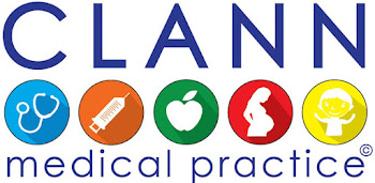🩺 Dr. Daragh O'Neill & Dr. Sana Mirza
⏰ Monday to Friday: 9am to 12.30pm and 2pm to 5pm
📞 (041) 213 6101

Antenatal & Postnatal Care
Comprehensive support for mothers during and after pregnancy
Our practice participates in the Maternity & Infant Care Scheme, which provides free maternity care to all expectant mothers ordinarily resident in Ireland


Common conditions expectant mothers experience
While every pregnancy is unique, there are several common conditions that many expectant mothers experience, with varying severity:
Nausea and vomiting: Often called "morning sickness," this can occur at any time of day and is most common in the first trimester.
Fatigue: Especially prevalent in the first and third trimesters.
Frequent urination: Due to hormonal changes and increased pressure on the bladder.
Back pain: As the pregnancy progresses and the baby grows, many women experience lower back pain.
Swelling: Particularly in the feet and ankles, often occurring in the later stages of pregnancy.
Heartburn: Common as the growing uterus puts pressure on the stomach.
Constipation: Due to hormonal changes and pressure on the intestines.
Mood swings: Hormonal fluctuations can cause emotional changes throughout pregnancy.
Breast tenderness: Often one of the earliest signs of pregnancy and can continue throughout.
Mild anemia: Many women experience a decrease in iron levels during pregnancy.




First Time Mothers: Guidance and resources
For your first pregnancy, you will typically have a series of appointments alternating between your GP and the maternity hospital. Here's what you can expect:
An initial examination with your GP, ideally before 12 weeks of pregnancy
5 additional examinations with your GP/Practice Nurse during pregnancy
6 appointments at your maternity unit or hospital
Your schedule may look similar to this:
GP Visits
As soon as pregnancy is confirmed
12 weeks
16 weeks
24 weeks
30 weeks
34 weeks
37 weeks
39 weeks
Common questions first-time mothers often have:
What happens during these appointments?
Your GP and hospital staff will monitor your health and your baby's development, perform necessary tests, and provide advice on nutrition and pregnancy care.Can I bring my partner to appointments?
Partners are usually welcome, especially for scans and antenatal classes.How long do appointments typically last?
GP appointments usually last 10-15 minutes, while hospital visits may be longer, especially if scans are involved.What if I have concerns between scheduled appointments?
Don't hesitate to contact your GP or maternity unit if you have any worries or questions between appointments.
Hospital Visits
20 weeks: (including anomaly scan)
28 weeks
32 weeks
36 weeks
38 weeks
40 weeks
How does the Maternity & Infant Care Scheme work?
How does the Maternity & Infant Care Scheme work?
The Maternity & Infant Care Scheme provides free maternity care to all expectant mothers ordinarily resident in Ireland. The scheme offers combined care delivered by a GP of your choice and a hospital obstetrician
You are entitled to this service regardless of whether you have a medical card or GP visit card.
The scheme covers pregnancy-related care, but not illnesses unrelated to pregnancy.
How do I apply for the maternity and infant care scheme?
On your visit to our practice, we will complete the form with you and submit the form to the HSE for processing.




Antenatal care: What care to expect during my pregnancy?
Antenatal care includes:
An initial examination with your GP, ideally before 12 weeks of pregnancy
Regular check-ups to monitor your health and your baby's development
Blood tests and ultrasound scans
Advice on nutrition, exercise, and preparing for birth
Your appointment schedule may be adjusted based on your individual needs and any potential complications.
Vaccinations
As part of your antenatal care, you will be offered important vaccinations:
Flu vaccine (offered between October and April)
Whooping cough (pertussis) vaccine (offered between 16-36 weeks of pregnancy)
These vaccines are provided free of charge and help protect both you and your baby.
Postnatal care: What happens after the birth of my baby?
The Maternity & Infant Care Scheme includes two postnatal visits to your GP:
An examination of your baby at 2 weeks old
An examination of both you and your baby at 6 weeks old
What care does my baby receive?
Your baby will receive
A check-up at 2 weeks old with your GP
A 6-week check-up with your GP




What additional services are available for me and my baby?
Additional services include:
Antenatal classes: Usually starting between 26-32 weeks of pregnancy, covering topics such as labour preparation, birth options, and newborn care. (https://www2.hse.ie/pregnancy-birth/pregnancy-care/antenatal-classes/)
Public health nurse visits: A nurse will visit you and your baby at home during the first six weeks after birth. (https://www2.hse.ie/babies-children/parenting-advice/caring-for-a-new-baby/help-and-support-with-feeding-a-newborn-baby/)
Breastfeeding support and advice: Available through classes and support from midwives. (https://www2.hse.ie/babies-children/parenting-advice/caring-for-a-new-baby/help-and-support-with-feeding-a-newborn-baby/)
Postnatal care: Support for both mother and baby during the early weeks. (https://www2.hse.ie/pregnancy-birth/pregnancy-care/public-care/)
Information on infant nutrition and development: Guidance on feeding practices and developmental milestones. (https://www.bordbia.ie/nutrition/babys-first-year/)
These services are designed to provide comprehensive support for you and your baby throughout pregnancy and the early postnatal period.
Information & Support
Learn more about pregnancy, birth and childcare
From 0 to 12 weeks
From 13 to 28 weeks
From week 28 until birth
Get in touch for appointments and inquiries.
© 2025. All rights reserved.
Opening Hours
Monday to Friday: 9am to 12.30pm and 2pm to 5pm
Closed Saturday, Sunday and Bank Holidays
info.clannmedical@gmail.com

